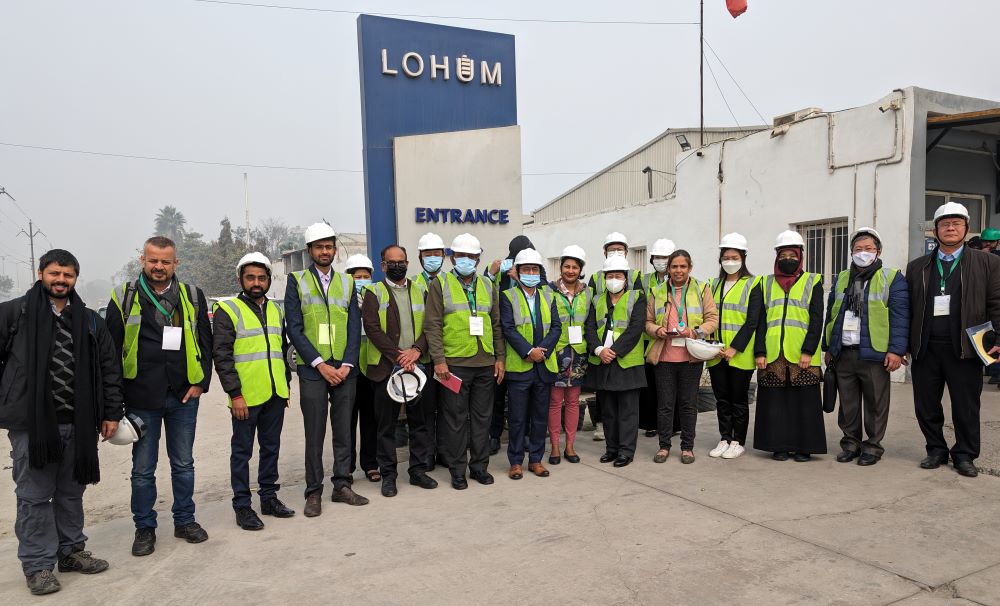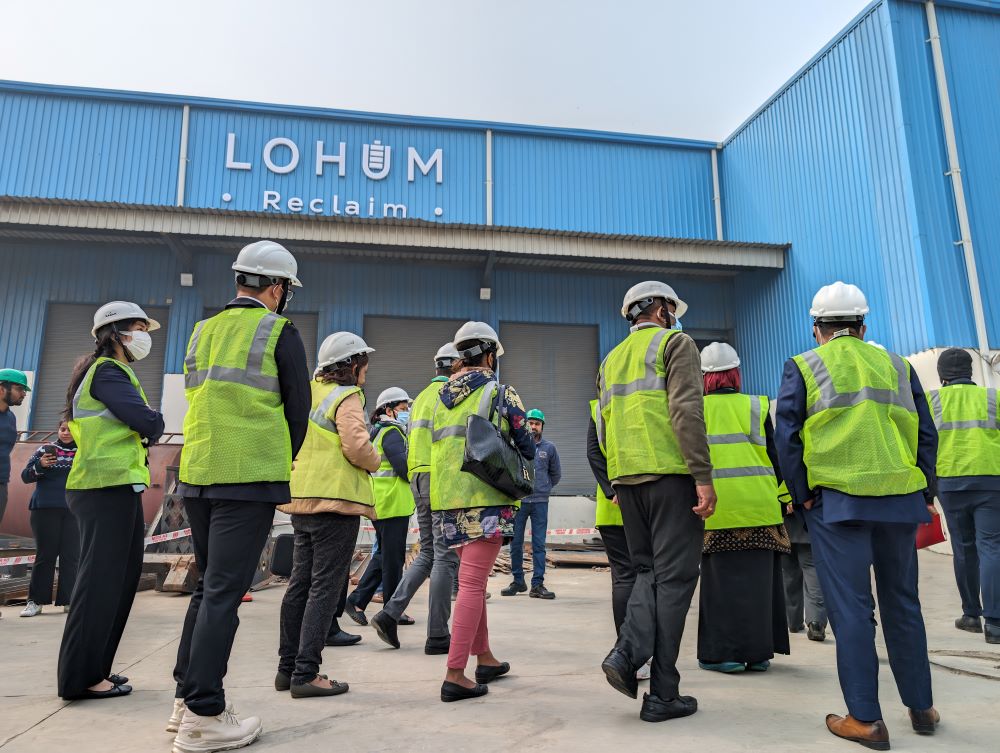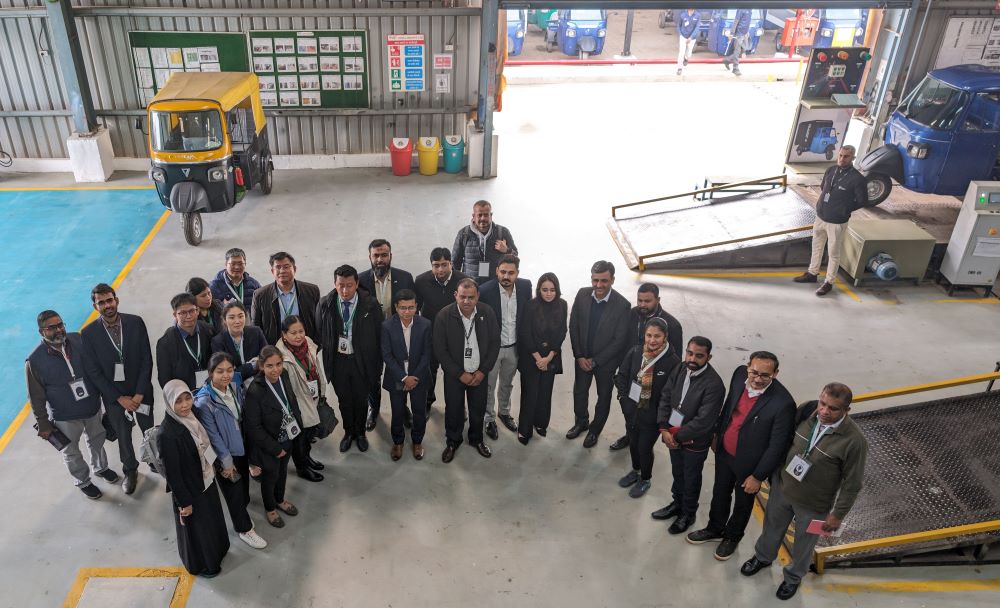Representatives from seven Asian nations gathered in New Delhi and the National Capital Region (NCR) on January 30 and 31 for an international study tour that highlighted the growing advancements in the electric vehicle (EV) sector in India, reflecting its commitment to sustainable mobility.

Representatives and officials from the national governments of Bangladesh, Bhutan, Indonesia, Sri Lanka, Philippines, Thailand, and Vietnam participated in this knowledge exchange program about India’s advancements in EV manufacturing and battery innovation. The tour was supported by NITI Aayog and organized as part of an integrated training initiative launched by Asia LEDS Partnership (ALP), a network of organizations and experts fostering low-emission, climate-resilient growth in Asia, with ICLEI South Asia serving as the ALP secretariat.

Sudhendu J. Sinha, Adviser (Infrastructure Connectivity & Electric Mobility) NITI Aayog, India highlighted that to successfully scale EV implementation, the focus must be on three key strategies, saying, “Launching an impactful awareness campaign with short, localized messages; supporting technological advancements to improve EV accessibility and efficiency; developing a sustainable business model that addresses the EV ecosystem value chain.”

The visit was centered on participants gaining insights from electric vehicle manufacturers, focusing on aspects such as battery technology, manufacturing processes, and recycling. The collaborative learning tour also involved understanding the techniques involved and the responsibilities borne by manufacturers in the EV industry.
The participants noted that the outcomes of the study tour were insightful and enriching. “The discussions around strategies for enhancing battery life and efficiency are not just theoretical; they are practical, actionable insights that will play a crucial role in making the electrification journey more sustainable and robust in our respective countries. By sharing our experiences and learning from each other’s advancements, we are paving the way for a greener, more efficient future. This kind of international collaboration is essential in our pursuit of a sustainable transportation ecosystem,” said Prillya Agusti, Environmental Impact Control Officer, Center for Sustainable Transportation Management, Ministry of Transportation, Indonesia who participated in the tour.
During the study tour, the participants visited state-of-the-art facilities of firms such as LOHUM in Greater Noida, a benchmark in battery recycling and circularity in India, and Omega Seiki Mobility in Faridabad, a pioneer in EV manufacturing. “With the increasing adoption of EVs, it is crucial to ensure circularity in the battery system through recycling and repurposing. These visits provided insights into managing EV battery hazards, enhancing battery life, efficiency, critical mineral lifecycle, and understanding the manufacturing process of electric two-wheelers, three-wheelers, and freight vehicles,” said Emani Kumar, Executive Director, ICLEI South Asia (secretariat for Asia LEDS Partnership)
This study tour stood as a powerful collaborative platform, igniting the exchange of knowledge and best practices among nations across the dynamic landscape of the Asia region. “We gained invaluable insights, particularly in the field of battery innovation and recycling. These learnings are pivotal for shaping the future of Bangladesh’s electric vehicle (EV) sector and existing sustainable mobility policies. Bangladesh aims to increase EV uptake up to 30% by 2030 in line with national commitments. This exposure will enable us to create a robust and efficient framework. In the coming days, we intend to conduct a comprehensive gap analysis to identify areas of improvement. With support from the ALP, Bangladesh can ensure that these gaps are addressed with effective policy measures. Our goal is to not only advance in the EV sector but also to reduce carbon emissions and ensure green transport in Bangladesh,” said Abu Naser, Deputy Secretary, Road Transport and Highways Division, Ministry of Road Transport and Bridges, Bangladesh.
Organized as part of the third phase of the Global Climate Action Partnership (GCAP), ALP EV Battery Training Series, initiated in May 2023, the tour’s focus was on practical learning from India’s leading EV manufacturing and battery recycling facilities. This initiative follows two successful virtual training sessions held in May and June 2023, which delved into EV battery circularity and lifetime performance. “After understanding the intricacies of battery recycling during this program, I am eager to share these details with my team in Thailand. We have long discussed the potential of battery recycling, but now is the time to move from dialogue to implementation. Learning from the advancements and developments in India has been particularly enlightening. The approach offers valuable lessons that we can adapt and apply in our context. This exchange of knowledge is a vital step towards a more sustainable future, and I am excited to contribute to the development of effective recycling plans in Thailand,” said Ms. Minta Poowatanavong, Engineer, Professional Level, Division of Energy Efficiency Promotion, Department of Alternative Energy Development and Efficiency (DEDE), Ministry of Energy, Thailand.
Participants in this workshop are part of the Leadership Group for Clean Transport in Asia (LG-CTA). The GCAP Asia regional platform, the Asia LEDS Partnership (ALP), established the LG-CTA as a collaborative to work towards clean and sustainable transportation in the region. The LG-CTA is a group of policy and technical leads, who are supported with multilateral activities on topics prioritized by member countries. Outcomes are progress on the design and implementation of policies and projects to achieve clean and sustainable transportation.
As of 2024, India’s EV industry has made significant progress in manufacturing and global market penetration. The electric two-wheeler market, in particular, has shown resilience after initial disruptions caused by updates in the FAME-II subsidy scheme. The market is now stabilizing with pricing close to non-subsidy levels, indicating a maturation phase.“The adoption of EVs is extending beyond major urban areas, with a noticeable increase in uptake from tier-2 and tier-3 cities. In the realm of public transport, electric buses, three wheelers and two wheelers, are particularly gaining momentum, contributing substantially to reducing emissions and sustainability in the EV sector,” said Kumar.
The Indian EV market size includes a diverse range of vehicle types such as commercial vehicles, passenger vehicles, and two-wheelers, with commercial vehicles. This diversity reflects the broadening of India’s portfolio in the EV sector, catering to varying consumer preferences and market segments. This progress in both domestic manufacturing and global market presence underscores India’s ambitions in the EV sector, driven by strategic investments, government support, and a focus on sustainable transportation solutions. Notably, under India’s Extended Producer Responsibility (EPR) rules, producers are required to fulfill their EPR obligation by ensuring that waste batteries are recycled through certified waste battery recyclers to meet assigned EPR. This regulatory framework strengthens the country’s commitment to sustainable practices in the EV industry.
Considering the specific priorities and proliferation of EVs in various Asian countries especially in aspects such as battery recycling, repurposing, and manufacturing, it is essential to address their unique progression needs. The ALP Secretariat plays a crucial role in this regard, offering tailored capacity-building programs and technical assistance through the LG-CTA initiative to provide multilateral support in these sectors.